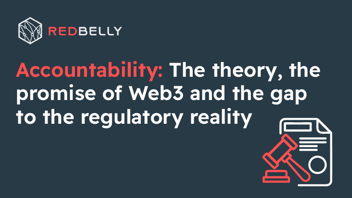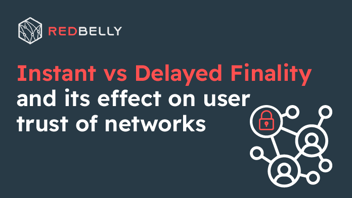The lack of accountability in the blockchain is now a thing of the past. With researchers from Australia, France, Singapore and Switzerland, Professor Gramoli, CTO of the Redbelly Network, designed an automated way of generating proofs of fraud on the fly within a blockchain network.
This was done through a series of innovations published in top scientific conferences of distributed computing and security between 2019 and 2022. Some of these scientific articles received the Best Paper Award of the conference, in which they were published among hundreds of submissions. This demonstrates a vital interest of the scientific community for accountability.
Why Accountability Matters
In classic blockchains, most attacks go unpunished. This is a direct consequence of their inherent forking design. For example, a double spending attack occurs when the blockchain forks into multiple branches containing conflicting transactions. Of course, these conflicts are problematic, so classic blockchains would simply erase some of these branches to guarantee that the blockchain converges towards a chain again. As a result, if an attacker successfully double spends, then the very same transactions causing the double spending will vanish. This makes it hard to detect double spending, let alone identify the attacker responsible for a double spending attack.
Among double spending attacks detected, Bitcoin Gold lost US$18M in 2018, and Ethereum Classic lost US$6M in 2020, so we know the risk is significant. The problem is that there is no built-in mechanism to guarantee that one can identify the attacker responsible for the attack. If one could instead guarantee that any misbehaving participant would be detected and punished, then there would be a natural incentive for every participant to behave. The sole existence of an accountability mechanism in the blockchain protocol could be sufficient as a threat to make the blockchain safer.

Research Achievements in Accountability
Starting in 2019, Civit, Gilbert and Gramoli defined the notion of accountable consensus. The definition of the accountable consensus problem is to solve the consensus problem or to guarantee that if an attacker manages to double spend, then this attacker will get caught. Although it might seem simple, this is a powerful incentive for any rational participant to behave. They proposed a solution to this problem that was proved correct and shown practically in a large scale environment. The idea is an accountable consensus protocol that requires participants to sign the key messages that let participants converge to a consensus. Since double spending is the expression of a disagreement, these signed messages can be cross-checked to identify the cause of the disagreement. As their sender signs them, it becomes easy to identify the sender who has sent conflicting messages. This idea was published in the proceedings of the 34th International Symposium on Distributed Computing (DISC) in 2020, and a more extended version was published in the IEEE 41st International Conference on Distributed Computing Systems (ICDCS) in 2021 [1].
In more recent work, Ranchal Pedrosa and Gramoli showed how this technique could be integrated in the first version of the Red Belly Blockchain to automatically generate some undeniable proofs of fraud and exclude the guilty participants from the participants executing the consensus protocol. They proposed a protocol called TRAP [2], and showed that one could leverage rewards to incentivise participants to play the role of undercover cops, pretending to join a coalition of participants simply to punish these guilty participants. The idea went further and forced consensus participants to deposit some stake that would be given back to the victim of double spending should they be proven guilty. This brought the security of blockchains to a new level. TRAP has been published in the proceedings of the 17th ACM ASIA Conference on Computer and Communications Security (AsiaCCS) in 2022.
In 2022, Gilbert, Gramoli, Guerraoui, Komatovic, Milosevic and Seredinschi demonstrated in their publication entitled "Crime and Punishment in Distributed Byzantine Decision Tasks" [3] that accountability could be introduced in other decision tasks beyond consensus. And the same year, some of these authors proposed an optimal but simple way to make any consensus protocol accountable in a publication entitled "As easy as ABC: Optimal (A)ccountable (B)yzantine (C)onsensus is easy!" [4]. This result offers the possibility for any blockchain system to become robust in the face of a coalition attack. Both articles were published at scientific conferences and received the Best Paper Awards out of around 1000 submissions. These awards are evidence that the international scientific community recognises these results as solving major distributed computing problems.
Blockchain for High-Value Assets
Security is of paramount importance for Redbelly Network, as previous posts described how its consensus protocol was formally verified or how its storage solution mitigates data breaches. The notion of accountability is bringing blockchain security to a new level by disincentivising participants to misbehave. Redbelly Network is thus the platform of choice for high-value assets that should be kept from being stolen or lost.
References
[1] Polygraph: Accountable byzantine agreement. P Civit, S Gilbert, V Gramoli. IEEE 41st International Conference on Distributed Computing Systems (ICDCS), 2021.
[2] TRAP: The Bait of Rational Players to Solve Byzantine Consensus. A. Ranchal Pedrosa, V. Gramoli. 17th ACM ASIA Conference on Computer and Communications Security (AsiaCCS), 2022.
[3] Crime and Punishment in Distributed Byzantine Decision Tasks. P. Civit, S. Gilbert, V. Gramoli, R. Guerraoui, J. Komatovic, Z. Milosevic, A. Seredinschi. 42nd IEEE International Conference on Distributed Computing Systems (ICDCS), 2022, Best Paper Award.
[4] As easy as ABC: Optimal (A)ccountable (B)yzantine (C)onsensus is easy! P. Civit, S. Gilbert, V. Gramoli, R. Guerraoui, J. Komatovic. 36th IEEE International Parallel & Distributed Processing Symposium (IPDPS), 2022, Best Paper Award.






